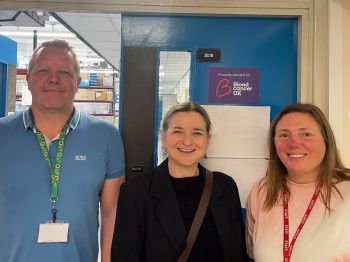News
Scientists secure funding to develop new drug to treat rare blood cancer
By: James Andrews
Last updated: Friday, 17 May 2024

University of Sussex scientists have secured funding from Omaze x Blood Cancer UK Research Fund to develop new treatments for mastocytosis, offering hope to people affected by this blood cancer.
Mastocytosis is a rare blood disorder where the body makes too many mast cells. Mast cells are an important part of our body’s immune system but having too many causes harm. Symptoms include flushing or itching, bone and muscle pain, and aneamia.
Working with researchers from the group of Professor Claus Nerlov at the University of Oxford, Professors Erika Mancini and John Spencer of the School of Life Sciences, aim to identify and develop a new drug that can effectively target and treat this disorder.
Professor Erika Mancini said: “Mast cells are immune cells that are involved in the defence against microorganisms. They are part of an early warning system that normally resides in connective tissues, including the outer surfaces of the body and digestive system. When activated they secrete molecules that attract and activate other immune cells, that actively kill invading pathogens.”
She continues:
“However, in aggressive forms of mastocytosis, these cells become excessively produced. This leads to the accumulation of mast cells in multiple tissues such as the liver, gut and bone marrow. The release of antimicrobial molecules by these excessive mast cells causes severe tissue damage, including disruption of normal blood cell production, liver dysfunction and bone degradation. Our objective is to develop an innovative drug to effectively target and treat this condition and we are grateful to Omaze x Blood Cancer UK for allowing us to continue this work.”
Currently, there is no known cure for mastocytosis and although existing drugs have shown some improvement in around 70% of patients, many individuals do not respond to these treatments. They are also often not effective in the long term, and people find their symptoms get worse or the disease comes back. There is therefore a need to identify new drug targets.
The researchers have identified a specific protein called LMO4, which plays an important role in the development of mast cells. They will now identify and develop drugs that target this protein, offering new hope to those affected by this blood cancer.
Dr Richard Francis, Head of Research at Blood Cancer UK, said: “Research in the last fifty years has improved the survival rates for people with blood cancer, but blood cancer is currently the UK’s third largest cancer killer and every death is one too many. This Omaze x Blood Cancer UK grant will help us develop kinder and less toxic treatments for people with mastocytosis – a type of blood cancer. We’re excited to see how the science progresses over the coming years.”